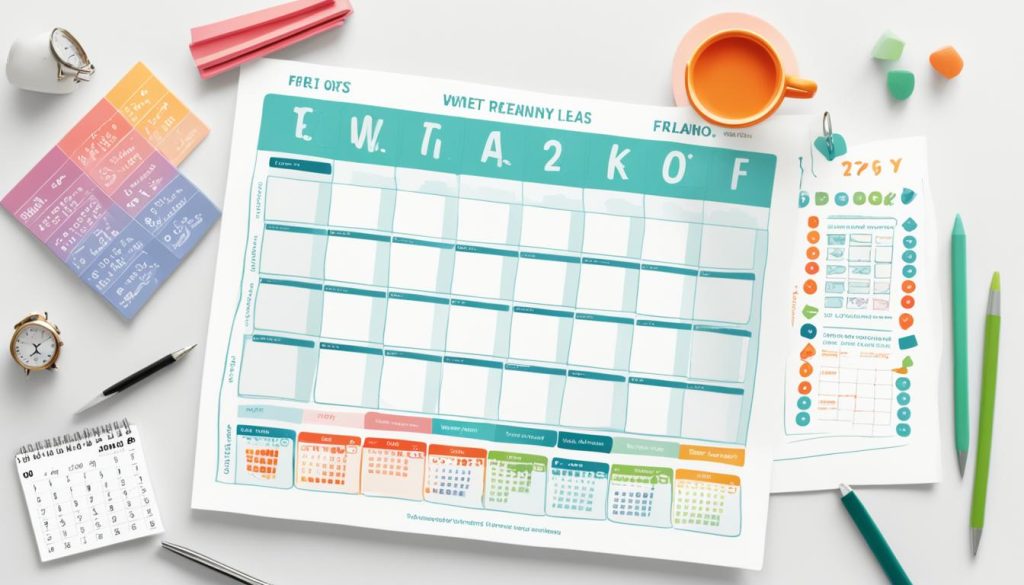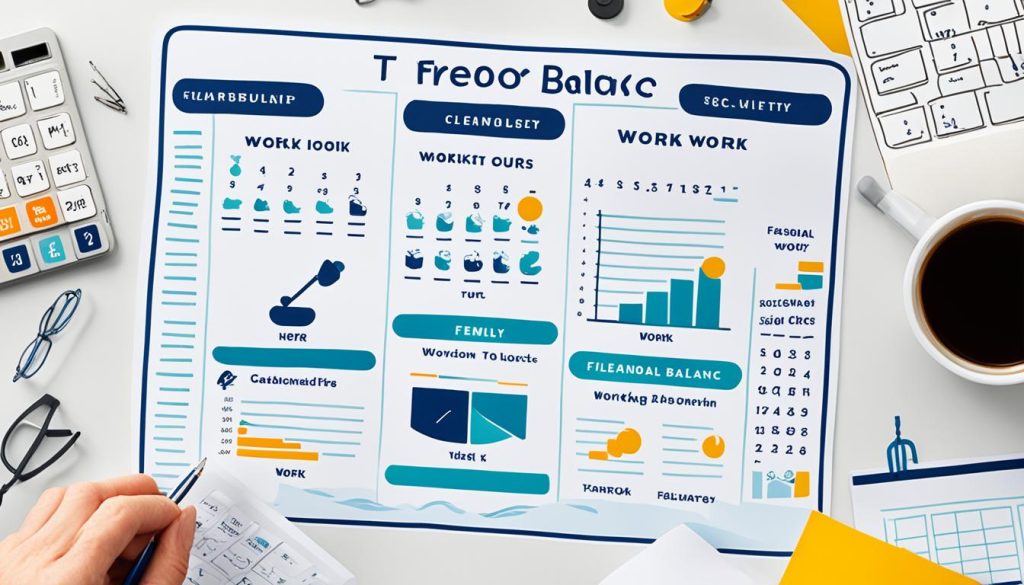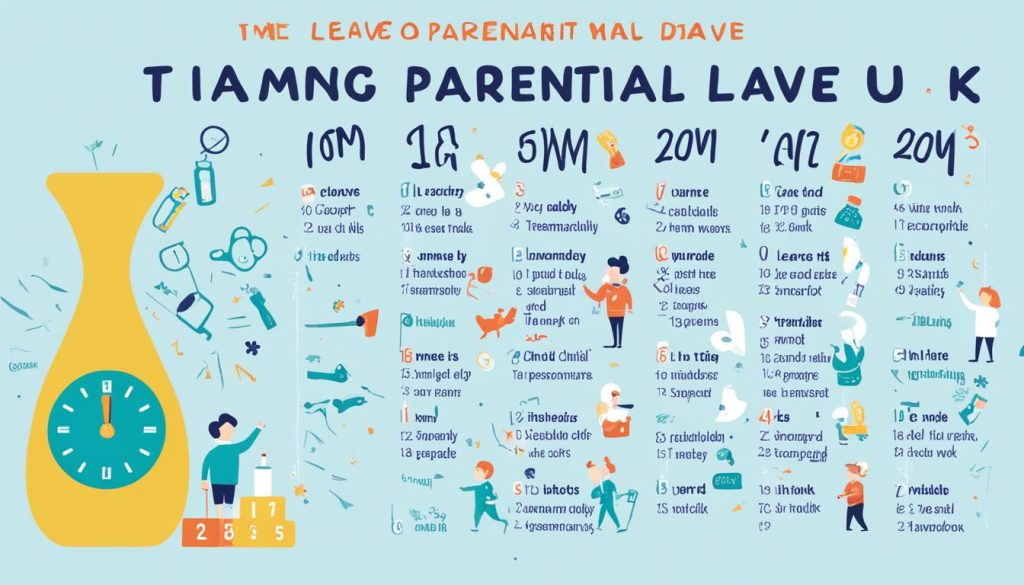Getting to grips with UK holiday entitlement and employment rights means more than just sticking to the rules. It’s key to having a good work-life balance. In the UK, the law ensures workers have their statutory leave UK rights. This includes time for holidays, getting better if sick, or spending precious moments with a new baby.
Finding out about your leave entitlement can be as refreshing as the break itself. This section helps workers understand and use their different types of leave. It’s about balancing personal time with work duties.
Understanding Your Entitlement to Annual Leave in the UK

In the UK, having paid annual leave is a legal right, not just a perk. It allows employees to rest, enjoy family time, or dive into hobbies apart from work. Knowing what holiday you’re due helps you plan better and makes sure you use all your leave.
Legal Minimum for Paid Holiday
Full-time employees in the UK are entitled to at least 5.6 weeks of paid holiday each year. This equals 28 days for those working five days a week, including public bank holidays. Employers can offer more, but this is the basic right ensuring workers get time off.
Calculating Pro Rata Holiday Entitlement
Part-time workers or those with irregular hours get their holiday based on the hours they work. Their holiday is worked out so it’s fair, based on how much they work compared to full-timers. This fair method helps everyone get the right amount of holiday.
Public Bank Holidays: Are They Extra?
The 5.6 weeks of statutory leave usually counts in public bank holidays. If your employer gives you more than the minimum leave, you could get extra days for bank holidays. These could be bonus days for relaxation or celebration.
Knowing about your leave rights ensures you get the most out of your time off. If you’re ever unsure, places like GOV.UK, ACAS, or Citizens Advice offer help. Understanding your holiday rights means you can enjoy a better work-life balance, as intended by these laws.
Employee Rights and Responsibilities for Taking Time Off

It’s important for workers to understand annual leave procedures to take time off. They need to follow their employment contracts and work-time regulations. This ensures a fair workplace. Let’s look at the rules for giving notice, getting approval, and how they fit with statutory annual leave rights.
Requesting Annual Leave: Notice and Procedures
Asking for annual leave usually means telling your boss ahead of time. Often, you need to give notice that’s twice as long as the leave you want. This helps bosses manage things smoothly.
To request leave, first check your job’s leave policy. Then, choose your leave dates carefully, avoiding busy times. Finally, ask for your leave in the way your company prefers.
After asking for leave, your boss should reply quickly. Remember, they can say no if work’s too busy. But once they say yes, they usually can’t take it back without a strong reason.
Company Policies vs Statutory Rights
Knowing the difference between your job’s rules and your legal rights is key. Jobs can have their own rules, like when you can take leave or policies on unused holidays. But these can’t go against the law.
- By law, full-time workers in the UK get at least 5.6 weeks’ paid leave a year.
- Some jobs might offer more holiday time or flexible schedules. But they must still meet legal minimums.
- If there’s a conflict, legal rights come first.
Understanding these rules is good for everyone. It helps workers and bosses respect each other’s time. Knowing about annual leave makes work life better and fairer for all.
Recognising the Signs That You Need a Break

Ignoring signs of burnout is easy, but your wellbeing is at risk. Professional life demands can overwhelm you. Without breaks, stress may lead to needing stress leave. Watch out for indicators you need to slow down.
The Impact of Burnout on Your Professional Life
Burnout shows up as fatigue, cynicism, irritability, and low productivity. Spot these signs early. A pause is vital for your wellbeing and career health.
Plan Your Breaks Strategically for Maximum Benefit
Plan your holidays wisely to fully benefit. Schedule breaks during quieter times at work. Use your leave for long weekends or longer breaks for a full recharge. This helps you return energised, ready for new challenges.
- Listen to your mental and physical cues suggesting burnout symptoms.
- Incorporate regular, short breaks into your yearly calendar to prevent burnout.
- Use leave to focus on activities that improve mental health wellbeing, such as relaxation, hobbies, and spending time with loved ones.
- Align break times with family and social events to maximize enjoyment and minimize work-related stress.
Understanding the value of rest is vital for your future health and career. Taking breaks shows smart planning, not weakness. It’s about staying in top shape and being happy.
Statutory Sick Pay (SSP): Eligibility and Claims Process

Finding your way with SSP eligibility in the UK is straightforward. We offer clear guidance on the sick pay claim process and what’s important for eligibility. This ensures you’re well-prepared.
- Qualifying Conditions: To qualify for SSP, being an employee who worked for their employer is necessary. You should also be ill for four days or more, including days off.
- Current SSP Rates: Eligible individuals get £99.35 every week for up to 28 weeks. This number can change each year, so keep up with HM Revenue & Customs for updates.
- Earnings Threshold: You need to earn at least £123 weekly before tax to be eligible for SSP in the UK.
- The Employer’s Role: Employers are key in the SSP claim process. They pay SSP to eligible staff and provide a claim form.
- Proof of Illness: You must give your employer a ‘fit note’ if sick for more than seven days. This note comes from a doctor or healthcare professional.
- Starting a Claim: Inform your employer about your sickness as soon as possible. Do this within their deadline or within 7 days if they don’t have one.
Getting the hang of SSP rates and rules helps you handle the system better. Citizens Advice is there to help with any problems in the claims process. This support lets you recover without worrying about money.
Navigating the Rules Around Sick Leave

Feeling sick and understanding sick leave and job protection helps you recover without stress. It’s key to know how to submit a fit note and your rights if ill for a long time. This ensures your health and job are safe.
Evidence and Notification Requirements for Employers
Starting the sick leave notification can be the first step when you’re ill. You should tell your employer as soon as you can, ideally on the first day you’re absent. If you’re away for over seven days, you need a ‘fit note’ from a doctor. This note is critical as it shows you’re sick and if you need work changes.
Understanding Your Rights During Long-Term Illness
- Knowing your rights during a long-term illness is crucial. There is protection against unfair job loss if you’re off for a long time because of health.
- You might get Statutory Sick Pay (SSP) or a company’s sick pay, depending on your job’s contract. Some illnesses may also offer extra support.
- It’s wise to get advice from experts like ACAS or check NHS Choices for more information on long-term illness rights and support.
Dealing with health problems can be hard. But knowing your rights at work can lower stress. Always put your health first.
Managing Work-Life Balance With Flexible Working Hours

Today, the topic of flexible working rights UK is more popular than ever. It’s clear that changing work hours can make life and work blend better. Thanks to this, UK laws now allow employees to ask for flexible working hours. This is great for those needing to fit work around their lives.
But how do you balance life and work with flexible hours? It starts with knowing how to ask for changes at work. It also means seeing the real perks of having a flexible schedule. To help you, let’s look at some key points:
- Making the Request: Any employee with at least 26 weeks’ work can ask for flexible hours. This right is protected by UK law. Employers have three months to respond to these requests.
- Balancing Responsibilities: With flexible working, you can choose different work options. Options like part-time, job sharing, or staggered hours help balance work and home life.
- Improved Well-being: Properly managed flexible schedules lead to less stress, more job happiness, and better mental health.
To ask for a different work schedule, knowing what you can request and how far your employer will go to help is key. The UK supports workers in seeking a better balance. Success depends not only on you but also on your employer’s readiness to see the shared value of flexible work.
Maternity Leave: A Comprehensive Guide

Are you pregnant and working in the UK? Here’s what you need to know about taking time off, understanding statutory maternity pay (SMP), and your rights. Having the correct information can make this big change easier to manage.
How Much Time Can You Take Off?
UK laws allow new mothers to take up to 52 weeks off. This includes ‘Ordinary Maternity Leave’ for the first 26 weeks and ‘Additional Maternity Leave’ for the second 26 weeks. You don’t have to take all 52 weeks, but you must take at least two weeks after your baby is born (or four weeks for factory workers).
Maternity Pay: How It Works
It’s important to understand SMP for budgeting during your leave. For the first six weeks, you’ll get 90% of your average weekly earnings before tax. After that, for 33 weeks, you’ll receive either the fixed SMP rate or 90% of your earnings, whichever is less. You need to meet certain job and pay conditions by your 15th week before the baby is due to get SMP.
Keeping in Touch Days (KIT Days)
KIT days let you work up to 10 days during your maternity leave without losing your SMP. These days are voluntary and need agreement from you and your employer. They allow you to keep updated with work and maintain contact with colleagues while on leave.
Paternity Leave in the UK: What Fathers Need to Know
Fatherhood transforms lives. In the UK, new dads have rights that help them bond with their baby. It’s key to know about paternity leave and pay. This knowledge helps expectant dads prepare for time with their child. Keeping up with parental leave rules is crucial for soon-to-be parents.
Determining Eligibility for Paternity Leave
To get paternity leave, certain conditions must be met. Fathers qualify if they are the biological dad, the mother’s partner, or plan to help raise the child. They need a fixed amount of service and must be employed. Telling your employer early ensures everything goes smoothly.
Understanding Statutory Paternity Pay
Statutory Paternity Pay (SPP) supports new dads financially while on leave. To receive SPP, dads must have been with their employer for a set time before the birth. They also need to earn over a certain amount. SPP is paid during paternity leave, helping dads worry less about money during this special time.
Navigating Shared Parental Leave

Figuring out shared parental leave UK can greatly affect how families handle the key first year with their new child. Offered as a flexible choice, SPL rights let parents share leave. This means both can be involved in early child care. We’ll look into shared parental leave and its benefits for family leave planning.
The idea behind shared parental leave is simple. It’s for parents eager to be part of their child’s early life. This option gives families the freedom to share the care and happiness of raising a newborn or adopted child. Plus, they don’t have to give up their jobs completely. Keep these points in mind:
- Both parents must share child care duties and meet work and pay conditions.
- They can take up to 50 weeks of leave and 37 weeks of pay between them.
- Shared parental leave UK can be split into different periods or taken at once.
- Parents can even be off work at the same time, making family time easier.
To start SPL rights, parents need to tell their employers properly. This includes stating how much leave each will take. It shows that both parents play equal roles in the child’s life from the beginning.
When planning family leave, it’s crucial to talk to your boss. This helps make the process smoother. Here’s a basic guide on applying for shared parental leave:
- Make sure both parents meet the criteria.
- Work out how much leave and pay you will use.
- Give your employers the required notices and forms.
- Plan your leave in chosen periods and agree on dates with your boss.
- Keep your boss up to date with any changes to your plan.
As family life changes, we need work plans that can change too. The UK’s SPL scheme recognises this. It supports families wanting to balance work and personal life well. Taking up shared parental leave can be a big step for parents ready for a shared parenting adventure.
The Process of Returning to Work After Leave

Coming back to work is a big step after being away for a while. This can be because of looking after children, health problems, or taking a break. Getting ready to go back and becoming part of the team again takes thought and effort. You’ll need to adapt to any new ways of doing things and show you’re ready to contribute.
Reintegrating into the Workplace
Rejoining the workplace is important when you start working again. You might feel excited or nervous. Talking to your bosses and team about your return can make things easier. They can update you on what’s been happening and any new ways the place works. Getting help from a mentor or joining a programme to catch up can also boost your confidence and skills.
Addressing Changes in Roles or Responsibilities
Understanding changes in your job is key after you’ve been away. Your role in the team might have changed. It’s crucial to talk to your boss about your job now and what they expect. You might also talk about working differently to start with, like starting part-time before going full-time.
If you’ve missed out on things at work, updating your skills or doing some training can help. Making a plan for getting better at your job and setting goals can make you feel more focused and happy about your career.
- Begin with open communication with your employer about the details of your return.
- Seek support from colleagues and consider finding a mentor if feeling overwhelmed.
- Understand any changes in your role and align with new company goals or projects.
- Consider upskilling or refresher courses to update your knowledge and skills.
- Discuss flexible working options if applicable to balance work and home life effectively.
Rights to Time Off for Dependents: Emergency Leave
In the UK, workers have rights to balance work with caring for others. Knowing your right to take time off for dependents is key in emergencies. This is crucial when you need to be there for your loved ones. The Employment Rights Act 1996 protects your job in these situations.
A dependent could be a spouse, partner, child, or anyone needing your care. Emergency leave UK laws provide a safety net in such events. This support covers various urgent needs, from childcare issues to school problems.
Emergency leave is often unpaid, but you can take a reasonable amount of time. It’s vital to tell your employer quickly. However, in a crisis, immediate notice might not be possible.
- Informing employer without unreasonable delay
- Describing the nature of the emergency
- Estimating the expected time off needed
For caregivers, this right is incredibly valuable. It helps balance work and family life amidst challenges. The UK law supports you during these unpredictable times. Knowing your rights helps you manage emergencies with confidence.
Understanding Unpaid Leave Options
Unpaid leave is a key option for balancing work and personal life. It lets people handle personal matters or take a career break while keeping their job. Understanding your rights to unpaid leave can make the process less worrying.
When Can You Take Unpaid Leave?
There are many reasons someone might need unpaid leave. This could be for learning, travelling, family needs, or volunteering. Since unpaid leave policies vary, they often depend on the employer or the job contract. It’s crucial to check your contract and talk to HR to know your rights.
The Financial Implications of Unpaid Leave
Going on a break without pay means you must plan your finances carefully. Before taking unpaid leave, look at your savings and budget for the time off. Getting advice on money management is also wise. A good financial plan helps you stay secure and calm while not working.
- Check your living costs during unpaid leave.
- Make a backup plan for sudden costs or emergencies.
- Know how the break might affect your pension or savings.
- Think about its impact on your future work and salary.
Thinking about unpaid leave is a big decision that offers chances for growth and new experiences. By carefully considering your rights, planning a break, and managing your money well, taking unpaid leave can be a positive and rewarding move.
Conclusion
Through our journey, we’ve stressed how vital it is to know your rights at work in the UK. Knowing about workplace rights helps you get fair treatment. It also helps keep a good balance between work and life. We’ve covered many types of leave, from holidays to sick leave, and maternity or paternity leave.
This article aimed to boost workers’ understanding of their legal rights and how to take time off. It helps whether you’re figuring out how much leave you get, looking at shared leave for parents, or coming back to work after leave. Understanding these rights means you can make choices that fit both your job and life goals.
To wrap up, using your rights makes work fair and supportive for everyone. Getting to know these rights paves the way for a career that’s rewarding in the long run. Remember, it’s not only about following rules. It’s about taking an active part in making work life better for all.
















